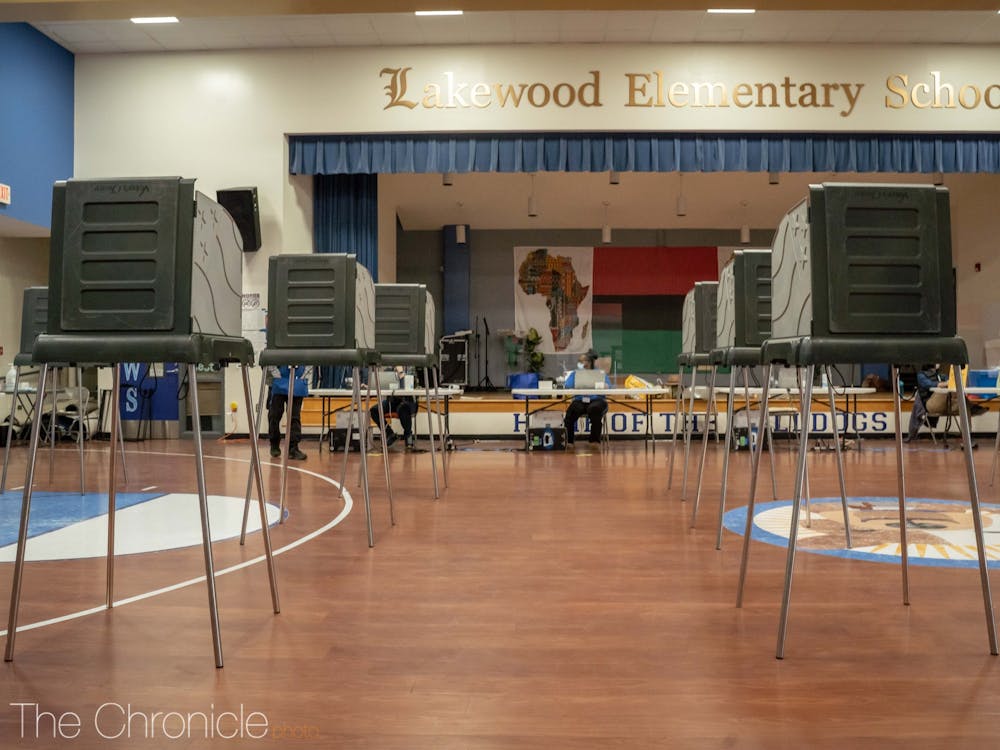With the presidential election balanced on a knife edge as ballots are counted in key states, Duke students from around the world are following developments in the race.
As of early Thursday morning, former Vice President Joe Biden is ahead in the presidential race, with media outlets allotting him 253 or 264 electoral college votes compared to President Donald Trump’s 213 votes.
Fox News and the Associated Press declared Biden the winner of Arizona late Tuesday night and early Wednesday morning, respectively, but CNN, The New York Times and other outlets have not yet announced a winner in the key swing state. Georgia, Nevada, North Carolina, Alaska and Pennsylvania have not yet been called.
Sophomore Wyatt Gildea, a Democrat who said that he is more moderate in his views, said he isn’t surprised that North Carolina appears to be leaning toward Trump.
Gildea attributed his suspicion of polls that predicted a Biden victory in North Carolina to the fact that he is from a conservative area near Asheville.
“I had just seen no change in my conservative friends and family members. There was nobody who voted for Trump in 2016 who wasn’t going to vote for him again. So I was really expecting it to not be a blowout [for Biden] at all,” Gildea said.
Gildea said that he is now cautiously optimistic about the national results of the presidential election.
Likewise, sophomore Darren Janz said that election night was “pretty underwhelming” for the Democratic Party.
“I think what the Democrats got wrong was that we underestimated the loyalty to Trump,” Janz said. “We thought that Biden would be able to bring back the voters who had previously voted Democrat but then flipped to Trump in 2016, and that didn’t really happen.”
However, Janz said that Democrats also gained a few victories, including N.C. Gov. Roy Cooper’s re-election. He is holding out hope that the 116,200 outstanding absentee ballots in N.C. can flip the races for Chief Justice of the Supreme Court and some of the state legislative races.
Janz said that it is “pretty clear Biden’s going to win” the election, and that the outcomes of his presidency would be determined by control of Congress.
He predicted that runoff elections in Georgia in January will impact whether the party gains control over the Senate. As of early Thursday morning, one of the races is projected to go to a runoff while the other has yet to be called.
“I think people are still talking about the presidential election, because technically, it hasn’t been called yet. But it is pretty obvious,” Janz said. “I think that very soon, the conversation needs to start moving towards the fact that if we want things to get done under the Biden presidency, then we need to win both of those Georgia runoffs.”
Janz stated that focusing all of the party’s resources on gaining unified control of the Senate will allow Democrats to pass substantive policy reform, including climate policy and public healthcare.
Sophomore Eliot Merriner, a Republican, said that although he was invigorated by the excitement of the election last night, he woke up exhausted and now doesn’t think the results of the presidential election will be finalized for a while.
“I’ve seen enough evidence on both sides that the election is close enough, it’s going to be contested. I feel like we’re just kind of in this weird Twilight Zone of not knowing who the president” will be, Merriner said.
Even without a contested election, results could still take time, as Duke professors told The Chronicle before Election Day. The final result in Pennsylvania, which could decide the election, may not be in until Friday. Trump holds a lead, but the remaining votes are expected to lean heavily blue and may be enough for Biden to take the lead.
North Carolina's presidential race is unlikely to be called for another week, as mail-in ballots postmarked before Nov. 3 but received before Nov. 12 will still be counted.
Despite the presidential election being up in the air, Merriner said that he is overall very pleased with the Republican Party’s performance in North Carolina.
“I think, looking at the results, Republicans performed much better than they were expected to, given the polling going into the election,” he said.
Get The Chronicle straight to your inbox
Sign up for our weekly newsletter. Cancel at any time.
Merriner also pointed to an increase in support for Trump among minority groups, which he thinks “does bode well for the future”.”
While Gildea and Janz both voted in North Carolina, Merriner voted absentee in his home state of Alaska. However, Merriner said he wished he had voted in North Carolina because of how close the race is.
When asked about Trump’s accusations against Democrats trying to “steal” the election, Merriner said that he believed voter fraud was “likely,” particularly in Michigan and Wisconsin, but that the courts would end up sorting it out. He also expects a winner to be announced within the week, and that whoever lost would contest votes in the states that “caused” the loss.
Regardless, Merriner said that he wasn’t “super worried.”
“Whoever gets elected, they’re not going to be the last president this country has,” Merriner said. “I think whoever the president is, life will still go on for the American people.”
While their Duke peers wait to learn the outcome of the race, Duke Kunshan University students from across the world are also closely watching the election.
“This Election Day caused me a more drastic emotional fluctuation than the one I experienced 4 years ago,” wrote junior Nathan Cao, who is from China, in a message to The Chronicle. Watching the results in Michigan and Wisconsin, Cao said he “really felt the world turned upside down when suddenly they became blue on my screen.”
Sophomore Joe Zhou took a stab at analyzing the state of the race.
“I think right now it is leaning towards Biden since late votes are [mail-in] votes that favors him and that's why Michigan and Wisconsin flipped blue, good news,” Zhou wrote in a message.
First-year Darpan Barua, from Bangladesh, wrote in a message, “This election has been watched by people around the world. It's really amazing to see how big of an influence the US has, such that its nail-biting election has been followed by millions. The turn around when Biden started leading in Wisconsin and Michigan was really fun to see.”
Meanwhile, after a semester of hosting virtual events and getting out the vote, the leaders of Duke Students for Biden were left following the results in a harrowing and protracted contest.
When Co-Chair Daniel Marshall went to bed Wednesday morning, he said, “the only thing that it seemed like we were walking away with was a defeat for our democracy.”
But Marshall, a sophomore, awoke to find that Biden’s standing had improved in Michigan and Wisconsin, in which Trump initially held a significant lead, and that it was too early to tell who would win.
“I think that was kind of inspiring,” Marshall said. “I think we’ve got to be hopeful for the future. Because why not?”
Right now, Marshall said people who oppose Trump’s reelection should focus on making sure all ballots are counted.
Co-Chair Rahul Krishnaswamy pointed out that Democratic Gov. Roy Cooper won reelection in North Carolina and that Biden has already won more votes nationwide than any other presidential candidate in history.
“People did their work, and our work paid off. It’s just that the other side did their work too,” said Krishnaswamy, a senior.
But Krishnaswamy acknowledged that Democrats went into the night hoping to win Senate and House seats but have so far lost seats in the House and—despite a current net gain of one Senate seat—have fallen short in some Senate races that they hoped to win. He argued that to win future elections, Democrats should focus more on outreach to a traditional base of farmers and union workers.
Marshall said it was disheartening to see the result of the N.C. treasurer race, in which Duke professor Aaron “Ronnie” Chatterji lost to incumbent Republican Dale Folwell, as well as other Democratic losses. But despite those disappointments—and his fatigue after waking up early to keep watching results come in—he struck an upbeat tone.
“We’ve just got to keep pushing,” he said. “Keep fighting the good fight.”
Matthew Griffin was editor-in-chief of The Chronicle's 116th volume.

Nadia Bey, Trinity '23, was managing editor for The Chronicle's 117th volume and digital strategy director for Volume 118.

Anna Zolotor is a Trinity senior and recruitment chair for The Chronicle's 118th volume. She was previously news editor for Volume 117.

